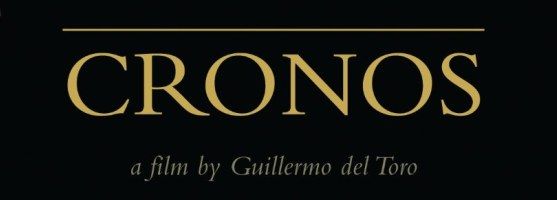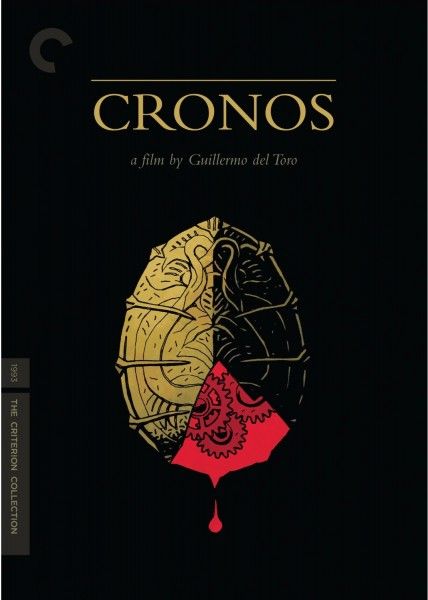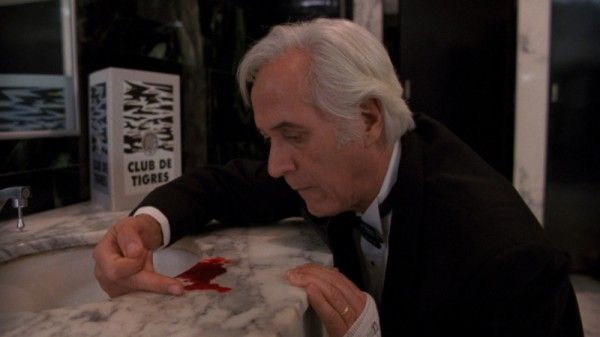All directors’ first films are an audition piece of some sort - at least these days. For writer/director Guillermo Del Toro, Cronos followed some work in television and short films, and was his chance to announce himself. To do so he made a vampire story, which is smart because horror films are the easiest to make for a low budget and get distribution. The plan – as it were – worked, and led to a move to Hollywood, where he has preserved and is now working on At the Mountains of Madness with James Cameron as his producer.
But everyone has to start somewhere, and Cronos was Del Toro making his world debut. Like a lot of first features, Cronos is also Del Toro’s Rosetta stone, as so many of his themes and interests (insects, clockwork, children, fairy tales) are key here, as Jesus Gris (Frederico Luppi) finds a trinket which causes immortality. But immortality comes with a price – a lust for human blood. My review of Criterion’s Blu-ray edition of Cronos follows after the jump.
Luppi’s Gris (whose name sounds like the Christian Lord and savior) is a normal-seeming man who lives with his wife Mercedes (Margarita Isabel) and granddaughter Aurora (Tamara Shanath). He runs an antique shop where Angel (Ron Perlman) shows up after he acquires a new addition to his collection. Gris sells it but he’s also found the statue’s secret, a bug-like machine that bites you. And if you wear it and keep feeding it, will keep you immortal, and make you younger-looking. At first Jesus is horrified, but the longer he wears it, the more he longs for the taste of human blood. Angel serves his uncle/father figure De la Guardia (Claudio Brook), who knows what the machine is and wants it to preserve his life, so Angel sets about getting it from Jesus.
Like so many first films, there is that sense of Del Toro auditioning for the bigger leagues. There is obviously a limitation of money here, so he chooses what he can work with and uses it. Post-The Devil’s Backbone and Pan’s Labyrinth, at one point I wondered if the granddaughter had a more active role, but she gets backgrounded to some extent in terms of danger. As a fan of the director, this surprised me. When she showed up at the beginning I had a chuckle thinking she might be tortured as with his previous child actors, but here the film rarely hinges on her in peril. Perhaps because the actress was of limited means, or perhaps because it was too expensive to put her in the midst of the worst of it, she’s never in too much dangerous. But again, she’s an outlier of Del Toro’s fascination with youth.
Even though the film benefits from the sense of it being a first time film, Del Toro was accomplished at this point, and got good performances out of his leads, and knows what he’s doing with the camera. If it’s a small film, it’s small by design, and it never betrays the material. And the material is a nice riff on the Dracula/vampire mythos. Del Toro finds a slightly new way to tackle the questions of immortality, with his variation on the reluctant bloodsucker. Like a lot of first films it’s hard not to type it as an artist building steam, but Cronos manages to work on its own terms.
The Criterion Collection’s version presents the film in widescreen (1.78:1) and in 2.0 surround. The film comes with two audio tracks, the first with an English language voice over, the second with that opening in Spanish with English subtitles. The film is gorgeous, with the 1080p transfer a noticeable improvement over the film’s DVD release. The film was shot by Guillermo Navarro (who’s been working with Del Toro for years) and his work here hides the film’s limitations. The film comes with DVD releases previous two commentaries, the first by Del Toro, the second by producers Arthur H. Gorson, Bertha Navarro, and Co-producer Alejandro Springall. New for this release is “Geometria (6 min.), an early short film by the director that riffs heavily on Argento/Bava/Fulci with an E.C. comics ending. Del Toro talks about it in an interview (7 min.). Also new is “Welcome to the Bleak House” (10 min.) which tours Del Toro’s house (which is made into a museum of his collectibles). Also new are interviews with Del Toro (18 min.), Navarro (13 min), Ron Perlman (7 min.), and an older interview with Frederico Luppi (5 min.). The film also comes with a still gallery, a trailer, and a booklet with an essay by Maitland McDonagh and Del Toro’s notes on the making of the film.



